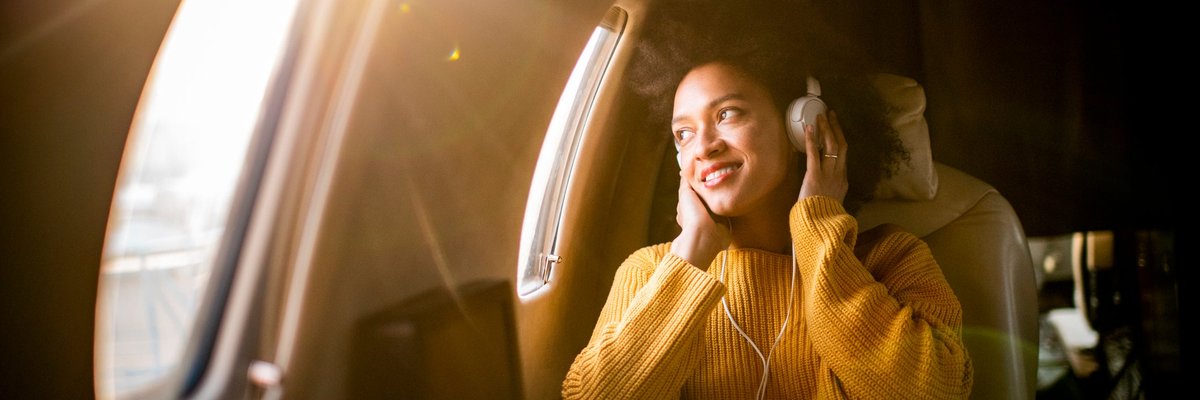When Is the Best Time of Day to Fly?
KEY POINTS
- The best time of day to fly is in the morning, before 8 a.m.
- Early morning flights are less likely to be delayed or go through turbulence, and they're often cheaper.
- There are advantages to flying at other times, too, so pick what works best with your travel plans.
Everyone may have different travel plans when they're on solid ground, but during air travel, most passengers want the same thing: No delays or cancellations. A smooth flight, hopefully without too much turbulence. And if you got a good deal on the airfare, whether you paid in cash or miles from your credit cards, all the better.
The departure time of your flight plays an important role in all three of those things. If you book a flight at the right departure time, you could increase your odds of an easy travel day at an affordable cost.
Here's the best time of day to fly
Sorry, fellow night owls. The best time of day to fly is the morning, ideally before 8 a.m. Your odds of experiencing flight delays increase throughout the day. Analytics site FiveThirtyEight calculated average flight delays based on 2013 data from the Bureau of Transportation Statistics. Here's what it found:
- Flights that departed between 6 a.m. and 7 a.m. were 8.6 minutes late, on average, which was the lowest of any time frame.
- Flights that departed before 6 a.m. and from 7 a.m. to 8 a.m. were nearly as good.
- Delay times increase from there. After 8 a.m., for every hour later you depart, the average delay time increases by about one minute.
- The average delay time peaks at 20.7 minutes from 6 p.m. to 7 p.m.
There are a few reasons why morning flights are less likely to suffer long delays. Late aircraft are one of the main causes of delays, and they're not an issue in the morning. The planes arrived the night before, so they're ready to go. Since the planes are at the airport overnight, there's also ample time to fix any technical issues.
As the day goes on, flight delays push back departure times, and these delays can cause a domino effect. Each delay not only affects that flight, but the next flight using that plane.
Airports are also less busy in the early morning hours. There are fewer departures and arrivals, so personnel can focus on getting the first flights of the day out on time. It's much busier the rest of the day, making it more likely that takeoffs and landings will be delayed.
More benefits of early morning flights
A smaller chance of delays is reason enough for many travelers to opt for morning flights. Even if you're prepared with travel insurance, it's nice when you don't need to use it. There are also quite a few other advantages of booking early morning flights:
- They tend to be cheaper. There's not nearly as much demand for these flights, since you need to get up extra early for them.
- If there are any issues, you're more likely to have other flight options that same day. There's probably a good chance you can find an alternative if your 7 a.m. flight is canceled. You'll have far fewer backup options if it's a 7 p.m. flight.
- You might have a better commute. If your flight is early enough to avoid rush hour, you won't need to deal with much traffic.
- The flight is less likely to experience turbulence. While thunderstorms can occur at any time, they occur most often during the afternoon and evening, according to the National Severe Storms Laboratory.
- The flight and the airport may not be as busy. The lower demand for early morning flights could also mean fewer people on your plane and at the airport. This isn't always the case, though. Some airports are busy at all hours of the day.
Pick the time that works best with your travel plans
Flying in the morning has its benefits, but there can also be advantages to flying later. For example, if you're returning home, you may prefer a later flight so you can have one more day of activities and enjoying your vacation.
It's also much easier to get a good night's sleep when you don't need to wake up at the crack of dawn. And in some cases, there aren't even morning flights available.
If you don't mind early morning flights, they're definitely worth taking when you can. But if they don't work for you, there are other ways to improve your air travel experience.
Checking airline reliability statistics can give you an idea of which ones are the likeliest to get you to your destination on time. And you can save money on airfare by using travel rewards credit cards. These tips can help you pick the right airline, and spend less on airfare, no matter what time you fly.
Our Research Expert
We're firm believers in the Golden Rule, which is why editorial opinions are ours alone and have not been previously reviewed, approved, or endorsed by included advertisers. Motley Fool Money does not cover all offers on the market. Motley Fool Money is 100% owned and operated by The Motley Fool. Our knowledgeable team of personal finance editors and analysts are employed by The Motley Fool and held to the same set of publishing standards and editorial integrity while maintaining professional separation from the analysts and editors on other Motley Fool brands. Terms may apply to offers listed on this page.



